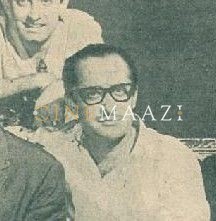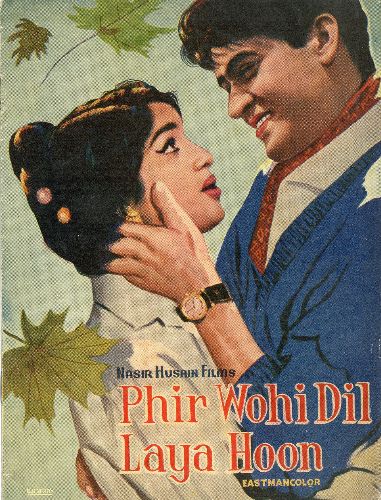Nasir Hussain

Subscribe to read full article
This section is for paid subscribers only. Our subscription is only $37/- for one full year.
You get unlimited access to all paid section and features on the website with this subscription.
Not ready for a full subscription?
You can access this article for $2 , and have it saved to your account for one year.
- Real Name: Mohammad Nasir Hussain Khan
- Born: 16 November, 1926 (Bhopal, British India)
- Died: 13 March, 2002 (Mumbai)
- Primary Cinema: Hindi
- Parents: Aamna and Jaffar Husain Khan
- Spouse: Ayesha Khan
- Children: Mansoor Khan , Nuzhat Khan
Celebrated as the creator of the Hindi film industry’s first quintessentially mainstream hit, Yaadon Ki Baraat (1973), producer, director, screenwriter Nasir Hussain is credited with producing and directing multiple successes such as Jab Pyar Kisi Se Hota Hai (1961), Phir Wohi Dil Laya Hoon (1963), Teesri Manzil (1966), Baharon Ke Sapne (1967), Pyar Ka Mausam (1969), and Hum Kisise Kum Naheen (1977), as well as Qayamat Se Qayamat Tak (1988), which introduced Hussain’s nephew Aamir Khan, and Jo Jeeta Wohi Sikander (1992) which he produced. In a career that spanned decades, he not only set the template for the ‘masala’ film genre, but also laid the framework of the musical romance film of the 90s. One of the most successful filmmakers in Hindi cinema over a period of 25 years, he picked up several popular awards such as the Filmfare Best Screenplay Award and Filmfare Best Film Award for Qayamat Se Qayamat Tak (1988), Filmfare Best Film Award for Jo Jeeta Wohi Sikandar (1992), and the Filmfare Special Award (1996).
Born on 16 November, 1926 in Bhopal, Nasir Hussain was the fourth of five children born to a History teacher father, Jaffar Husain Khan, and Aamna Khan. Despite his family’s orthodox leanings, he was attracted to the performing arts and participated in skits in his locality. An avid reader, he went on to earn his BA degree in Lucknow. Writing many short stories and radio plays, he occasionally performed in them as well. Incidentally, years later he would go on to adapt a prize-winning Urdu short story of his, into a film - Baharon Ke Sapne (1967)). Working as a secretary for a year, he moved to Bombay, where he was hired by Filmistan Studios’ honcho, Sashadhar Mukherjee. His first chance came when Agha Jani Kashmiri fell ill, and someone was needed to complete the dialogues for Chandni Raat (1949). Although it was not a Filmistan production, Mukherjee liked Hussain’s work and gave him more opportunities. Thus began his journey in films as a writer, wherein he penned films such as Shabnam (1949), Shabistan (1951), Shart (1954), the mega hit historical Anarkali (1953), as well as the comedies Munimji (1955) and Paying Guest (1957). The superhit success of Anarkali established him in the industry. He would consider Sashadhar Mukherjee to be his mentor, learning a great deal about filmmaking from him.
His directorial break came when S Mukherji assigned him the comedy Tumsa Nahin Dekha (1957), which Husain himself had written. Upon Sashadhar Mukherjee’s insistence he cast Shammi Kapoor, then a struggling actor living in his brother’s shadow, as the lead. The film, a frothy musical, struck bullseye at the box-office, setting the tone for Hussain’s future films—of the carefree hero romancing the heroine with musical flair, sending the villains packing, and singing together into the sunset with his beloved. The film established Shammi Kapoor as a star, and the duo went on to work together again in the Hussain-directed Dil Deke Dekho (1959). He launched former child actress Asha Parekh as heroine in this film. Setting up Nasir Hussain Films, he created multiple hits including Jab Pyar Kisi Se Hota Hai (1961), Phir Wohi Dil Laya Hoon (1963), Teesri Manzil (1966), Baharon Ke Sapne (1967), Pyar Ka Mausam (1969), Caravan (1971) and Hum Kisise Kum Naheen (1977). In many ways his films ushered in the age of modern youthful romances, fuelled by energetic soundtracks.
The 80s saw his films flounder Zamane Ko Dikhana Hai (1981) was his first flop. Manzil Manzil (1984) couldn’t find favour either, and the same fate awaited Zabardast (1985), which was to be his last directorial venture. The success story, however, was to continue, with his son Mansoor Khan taking up the reins and going on to direct Qayamat Se Qayamat Tak (1988), starring Nasir Hussain’s nephew Aamir Khan. The script of the musical romance was written by Hussain himself—a contemporary take on tragic romances such as Romeo and Juliet, Heer-Ranjha and Laila-Majnum. The film became a roaring commercial and critical success, also winning the Filmfare Best Film Award. It also won kudos for reinventing the romantic musical genre in Hindi cinema, as well as establishing the mould for musical romances of 90s Hindi films. Nasir Hussain won the Filmfare Best Screenplay Award for this film. He went on to pick up the Filmfare Best Movie Award for producing Jo Jeeta Wohi Sikandar (1992), which again brought together the Mansoor Khan-Aamir Khan collaboration. The last film that Hussain wrote was Akele Hum Akele Tum (1995). A romantic drama film again starring Aamir Khan and directed by Mansoor Khan, it was loosely based on the 1979 American film Kramer vs. Kramer.
Hussain was married to Ayesha Khan nee Margaret Francina Lewis, whom he had met when she was an assistant choreographer during the filming of Munimji (1955). The couple had two children—Mansoor Khan and Nuzhat Khan. Hussain was romantically involved with Asha Parekh, whom he had cast as heroine in several films. Parekh, in her 2017 memoir "The Hit Girl", called Nasir the "one and true love of my life." The couple chose not to marry. Parekh remained unmarried, and Hussain departed a year after the death of his wife in 2001.
Nasir Hussain passed away on 13 March, 2002. A book on his cinema titled Music, Masti, Modernity: The Cinema of Nasir Husain, written by Akshay Manwani, was released in 2016.
References
Manwani, Akshay. Music Masti Modernity: The Cinema of Nasir Hussain¸ HarperCollins India, 2016
-
Filmography (9)
SortRole
-

Zabardast 1985
-

Caravan 1971
-

Baharon Ke Sapne 1967
-

Dil Deke Dekho 1959
-
Tumsa Nahin Dekha 1957
-














.jpg)



